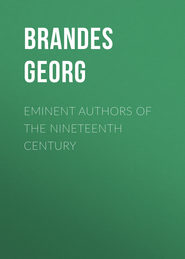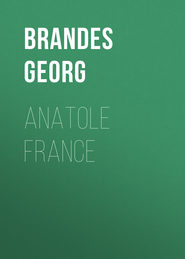По всем вопросам обращайтесь на: info@litportal.ru
(©) 2003-2024.
✖
Main Currents in Nineteenth Century Literature – 3. The Reaction in France
Настройки чтения
Размер шрифта
Высота строк
Поля
"'Tis nothing new; this I have told you oft;
I know you well, you and your evil kind.
And long it was a mystery to me
How Nature could endure you in her realm.
Corrupters of mankind! Even as a child,
My guileless heart shrank from you with distrust —
That honest, fervent heart, that loved the sun,
The cool fresh air, and all the messengers
Of Nature, dimly discerned and great.
For even then I timidly perceived
How ye would take our true love of the gods
And make it serve some baser, selfish end —
And that in this ye would that I should follow you.
Begone! I cannot look upon the man
Who practises religion as a trade;
His countenance is false and cold and dead,
As are his gods."
8
M. Bernays: Zur Entstehungsgeschichte des Schlegelschen Shakespeare.
9
"In thy kingly flight, young eagle, thou wilt pierce the thickness of the clouds, and find the way to the temple of the sun-god – else his word, spoken through me, is false."
10
"I held not my own wreath too precious to crown thee with it to the service of Apollo; but – a better is thy destiny."
11
"Welcome, sublime thought, that makes of me a god! Things are, because we have thought them. – In the dim distance lies the world; into its dark caverns falls a ray of light, which we brought with us. Why does this world not fall into atoms? Because the power of our will holds it together! – Glad at heart because I have escaped from my chains, I now go boldly forward in the path of life, absolved from those irksome duties which were the invention of cowardly fools. Virtue is, because I am; it is but the reflection of my inner self. – What care I for forms which borrow their dim splendour from myself? Let virtue wed with vice! They are but shadows in the mist. The light that illumines the dark night comes from me. Virtue is, because I have thought it."
12
Tieck: William Lovell, i. 49, 52, 172, 178, 212; ii. 110.
13
"Pedantry asked Fancy for a kiss; she sent him to Sin; audaciously but impotently he embraces Sin; she bears him a dead child, by name Lucinde."
14
"A hunter blew into his horn, and all that he blew the wind carried away."
15
A. Ruge: Gesammelte Schriften, i. 328, &c.
16
"Her mind was occupied with household cares —
The washing, and the china, and the cook:
Did I begin to speak of endless love,
She took the bristled clothes-brush in her hand,
And calmly turned me round and brushed my coat.
All this I bore quite placidly, but not
That, sitting, standing, everywhere we went,
Yes, even at concerts, when sweet strains beguiled,
Entwining, clicking, rustling, never still,
Her elbows flying, thumping on her side,
Her knitting-needles vigorously she plied."
"The sacred hymeneal couch had received us; Luna's chaste beams illumined our chamber. Encircled by white arms I lay, praying for Aphrodite's favour, dreaming of the marvellous child that needs must be the offspring of a night like this, the mighty hero who in fulness of time shall see the light. Soft taps upon my shoulder rouse me from my dream; 'tis my sweet bride caressing me; I thank her silently, with tender, meaning smile. One moment later, and my heart is torn by hellish pangs of disillusionment; it is her knitting that is dancing on my back; worse still – she is at the turning of the heel, that point when the most skilful, despite their counting, often blunder."
17
Plitt: Aus Schelling's Leben, i. 282. "I can bear it no longer; I must live once more, must let my senses have free play – these senses of which I have well-nigh been robbed by the grand transcendental theories to which they have done their utmost to convert me. But I too will now confess how my heart leaps and the hot blood rushes through my veins; my word is as good as any man's; and of good cheer have I been, in fair weather and in foul, since I became persuaded that there is nothing real but matter. I care not for the invisible; I keep to the tangible, to what I can taste and smell, and feel, and satisfy all my senses with. I have no religion but this, that I love a well-shaped knee, a fair, plump bosom, a slender waist, flowers with the sweetest odours, full satisfaction of all desires, the granting of all sweet love can ask. If I am obliged to have a religion (though I can live most happily without it), then it must be the Catholic, such as it was in the olden days, when there was no scolding and quarrelling, when all were kneaded of one dough. They did not trouble about the far-off, did not look longingly up to heaven; they had a living image of God. The earth they held to be the centre of the universe, and the centre of the earth was Rome. There the great vicegerent sat enthroned, and wielded the sceptre of the world; and priests and laity lived together as they live in the land of Cocagne; and in the house of God itself high revelry was held."
18
Köpke: Tieck's Leben, i. 193.
19
Florentin, pp. 65, 80, 170, 195, 230, 310.
20
Haym, Die romantische Schule, 509, 525, 663, &c.
21
Caroline, i. 254, 259, 261.
22
Caroline, i. 393.
23
Caroline, i. 347, 348.
24
Caroline, ii. 2.







